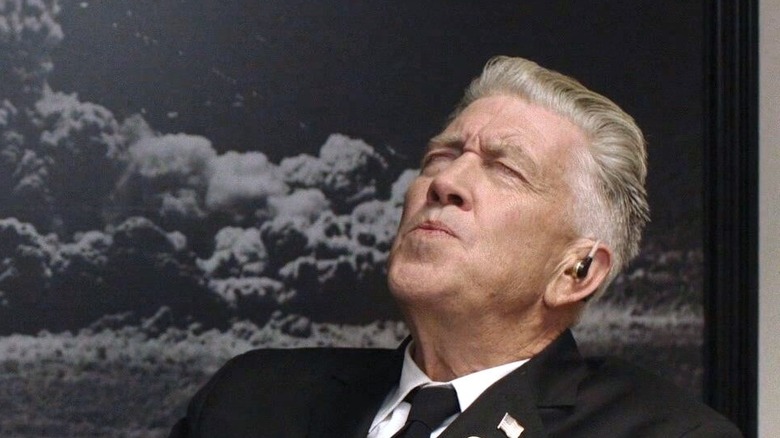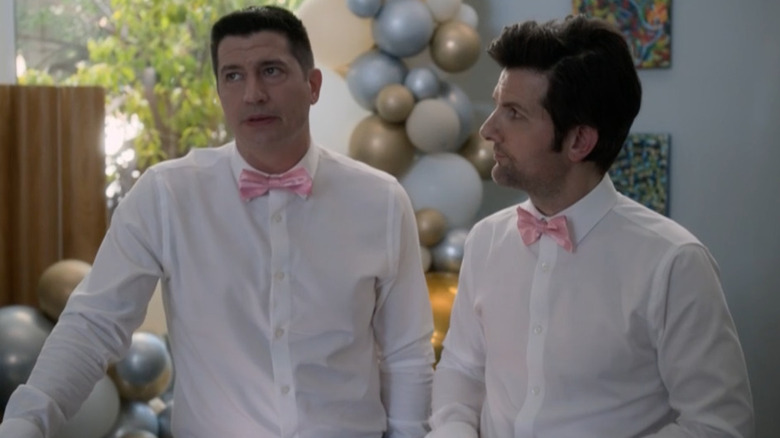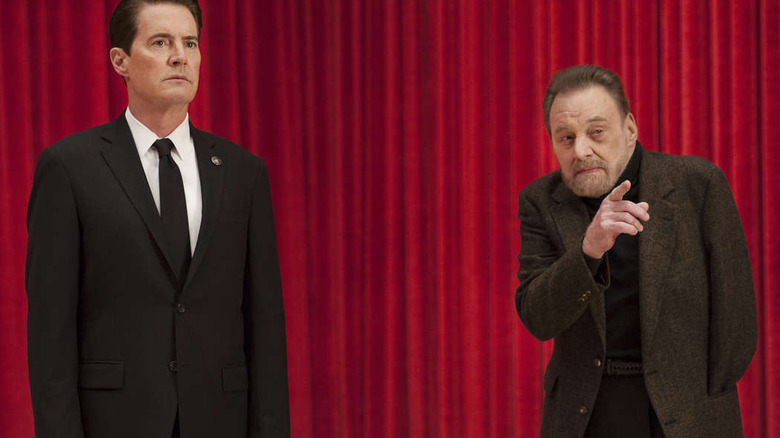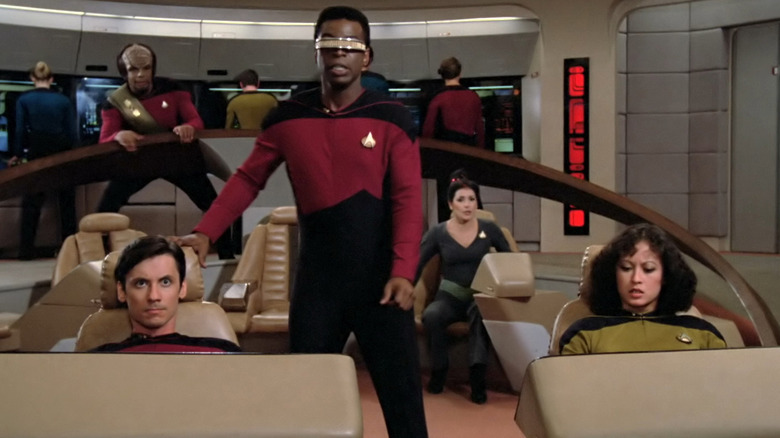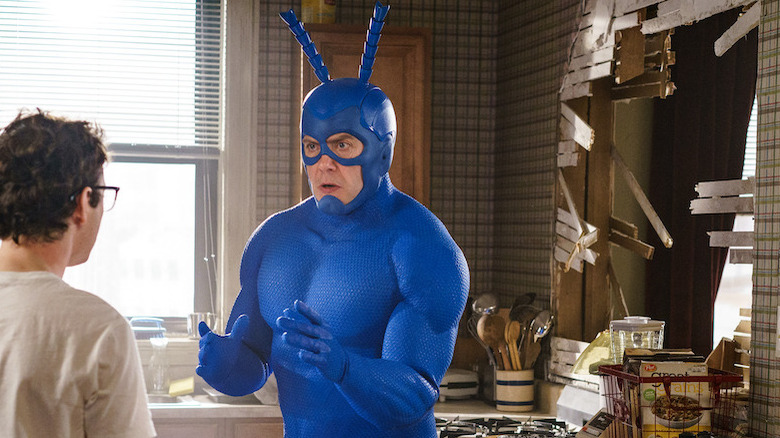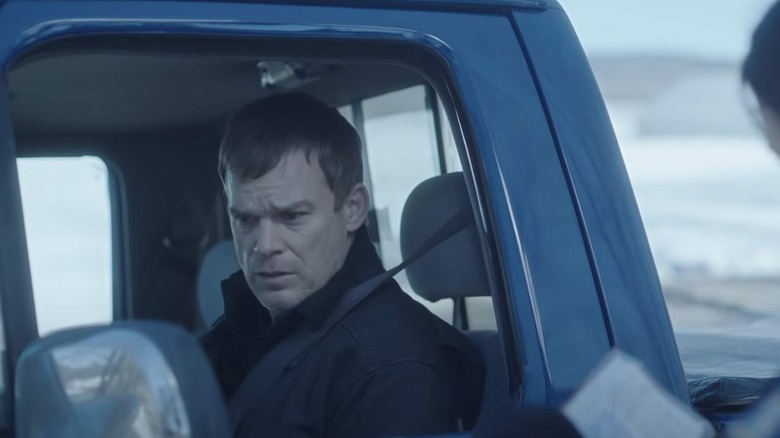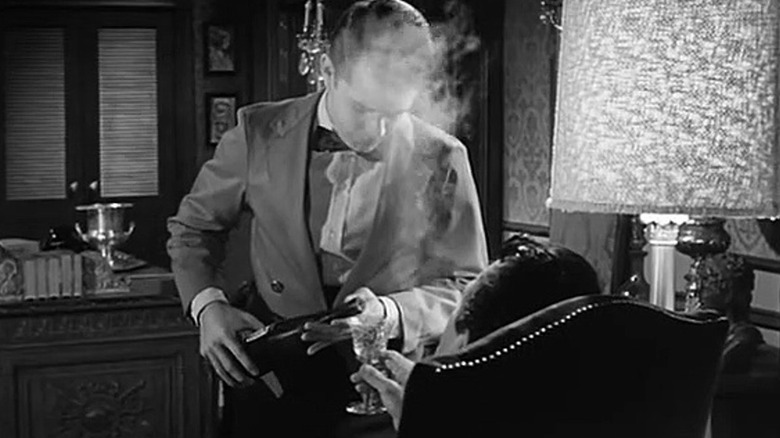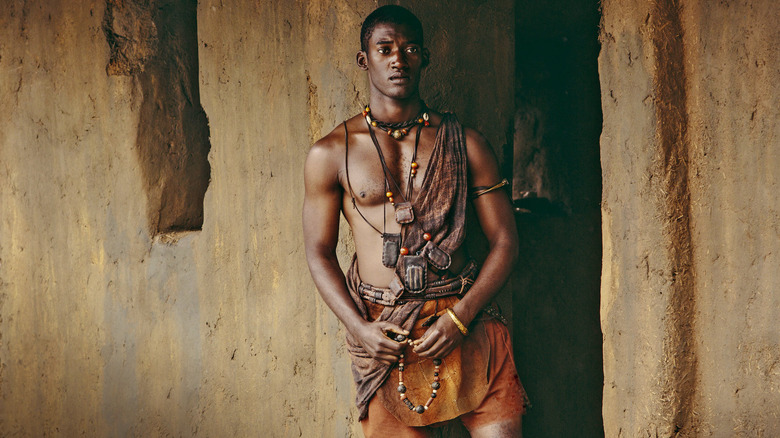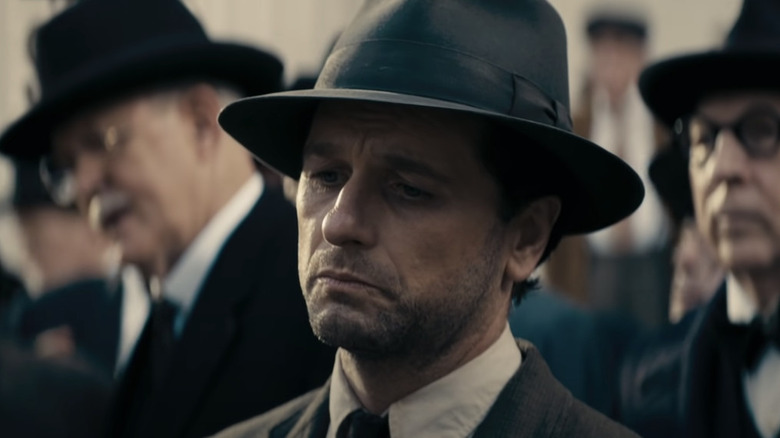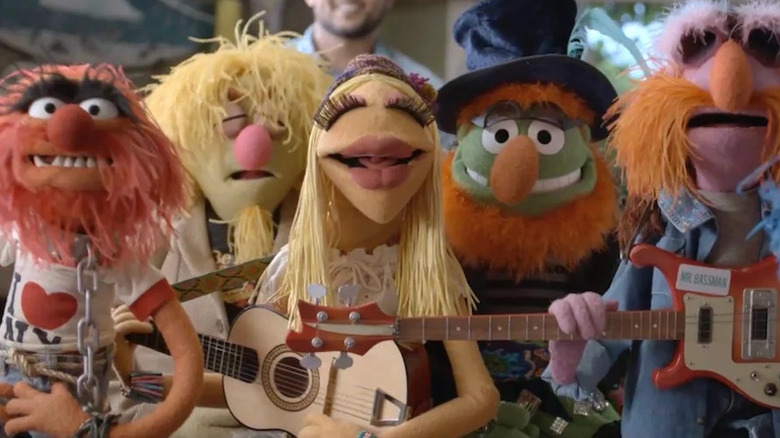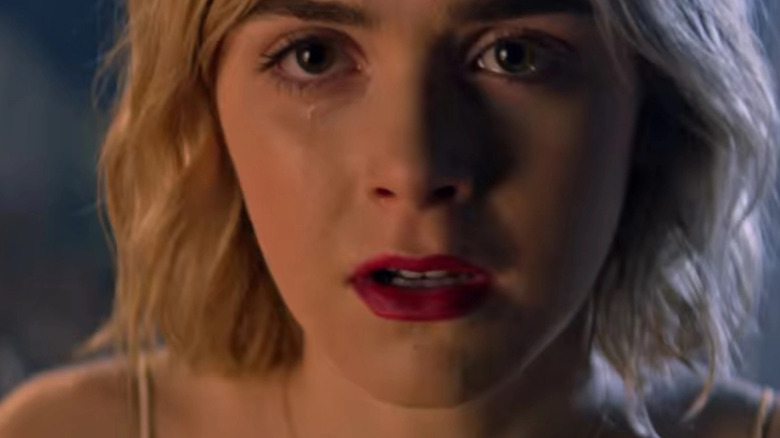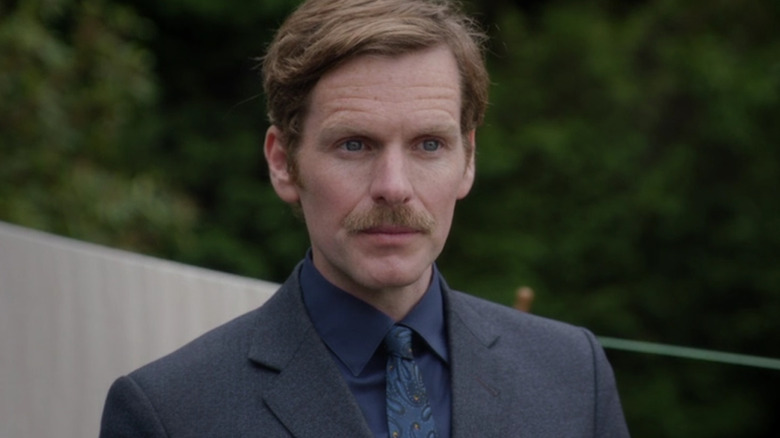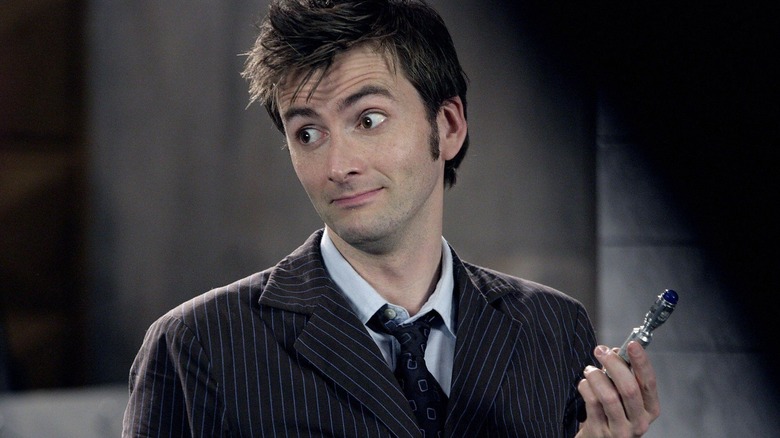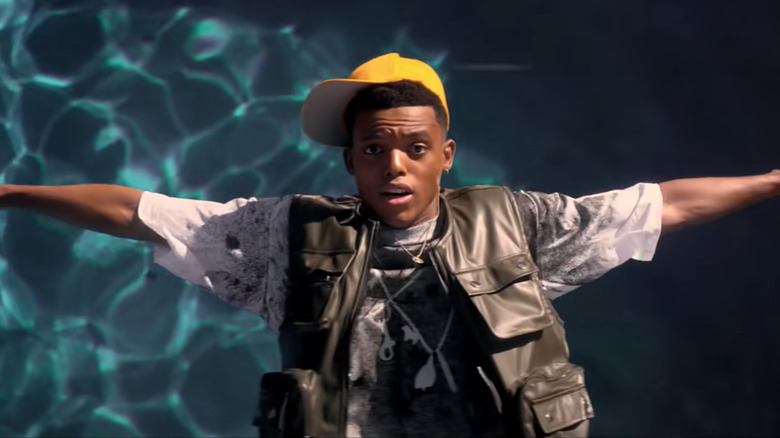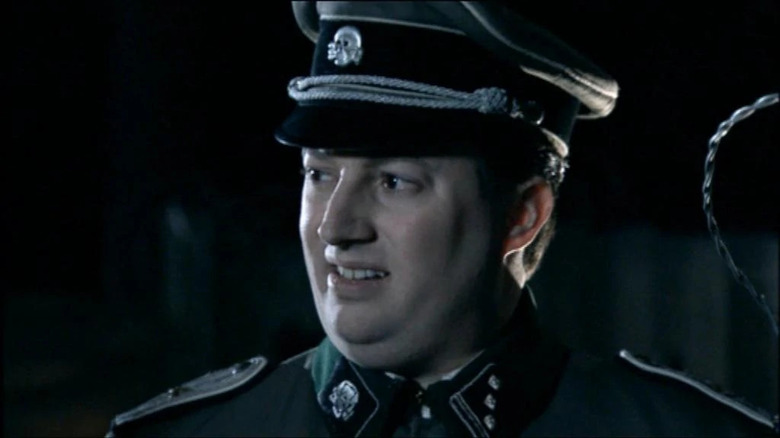TV Reboots That Were As Good Or Better Than The Original Version
Remakes and reboots are all the rage these days, and that applies equally to film and television. Studios and networks often consider reboots to be safer bets than original ideas because they have a proven track record and a built-in audience comprised of fans of the original. Many reboots come off as fairly transparent cash grabs or wind up being nothing more than shallow imitations of their predecessors. Sometimes, however, the original creative team comes back to their old stomping grounds to deliver another quality television experience, or a new showrunner steps up to the plate with a fresh vision for a popular classic.
While reboots often have an — arguably deserved — questionable reputation, a healthy dose of skepticism is more than fair when approaching a freshly rebooted series. This is especially true if the original show is one that you hold near and dear to your heart. They may belong to the minority, but here are 14 shows that are about as good or even better than their original versions.
Party Down
"Party Down" was a sitcom about the trials and tribulations of a group of aspiring actors working as caterers to make ends meet in Los Angeles. As with plenty of other shows on the Starz network, the series was never a massive mainstream hit, but had a dedicated fanbase. After two seasons, the show was canceled, and the cast and series creators all went their separate ways.
A full 13 years later, Starz brought the show back, and almost the entire original cast returned. The biggest complaint one could levy at the revival is that it isn't long enough — the new season was only six episodes long, while the original run consisted of two 10-episode seasons. Other than its truncated length, the revival is a slicker version of the original show, and just as funny as ever. Original "Party Down" star Lizzy Caplan was only able to appear in one of the new episodes, but Adam Scott, Megan Mullally, Jane Lynch, Ken Marino, Martin Starr, and Ryan Hansen all made full, much-welcomed returns to their old starring roles. The new season also added a few big names including James Marsden and Jennifer Garner, the latter of whom went beyond a typical guest star role, appearing in all six episodes.
Twin Peaks: The Return
"Twin Peaks" only lasted for two seasons and a total of just 30 episodes on ABC in the early '90s but, in that brief time, it became a cultural phenomenon, changing the face of television forever. After the show's premature cancelation, over 25 years went by with the story left unfinished.
Original series co-creators Mark Frost and David Lynch reunited along with most of the original cast to deliver "Twin Peaks: The Return" on Showtime in 2017. The switch from network to premium cable channel meant that the series not only had a significantly higher budget, but also that it was no longer beholden to the restrictive censorship rules of broadcast television. With a much darker tone than the original series, "The Return" surpassed all fan expectations and predictions, delivering an 18-hour whirlwind that met or possibly even outdid the original show.
One major leg up that "The Return" has over the original series is that David Lynch was in the director's chair for every single episode. Not only were there far more cooks in the kitchen on "Twin Peaks," but Lynch left the show entirely for part of Season 2, which fans point to as its biggest weak spot. Luckily, he returned to fix the show by the end of the second season and delivered one of the most stunning TV climaxes of all time. Then, he returned again decades later with total creative control to bring viewers his uncompromised vision for "The Return."
Star Trek: The Next Generation
"Star Trek" — commonly referred to these days as "Star Trek: The Original Series," since there have been so many different iterations — aired on NBC for three seasons in the 1960s. After a short-lived animated reboot in the '70s, the next major television incarnation of "Star Trek" didn't arrive until the late 1980s. With seven seasons and 176 episodes, "Star Trek: The Next Generation" wound up running for more than twice as long as "The Original Series."
"Next Generation" takes place another century into the future and follows a new Starfleet team played by the likes of Patrick Stewart, LeVar Burton, Jonathan Frakes, and Brent Spiner. Just as the original "Star Trek," "The Next Generation" expanded beyond the television screen with a number of feature films following the further adventures of the cast. Beyond exceeding "The Original Series" in length alone, "The Next Generation" was considered by many to be the superior series, as it served as an evolution of the format. In some ways, "The Next Generation" is a perfect reboot, setting the standard for what a top-tier revival should strive to achieve.
The Tick
"The Tick" is one superhero property that has always been well-liked, but has struggled to find a large enough audience to be sustainable. The character started out in print form with "The Tick" comic book series, which was successful enough to receive an adaptation as an animated television series. This first foray into TV lasted for three seasons and provided plenty of laughs as both a superhero comedy and a parody of other comics, movies, and shows.
"The Tick" is one of the rare examples of a show receiving not one but two reboots, both of which were live-action and had unfortunately short runs, but were undeniably funny and enjoyed cult followings. The first reboot landed on Fox in 2001, the same network that aired the animated series. Patrick Warburton brought his distinctive voice to the blue hero, while his sidekick Arthur was played by David Burke. After just nine episodes, the show was axed by Fox, but has had a considerably longer post-airing shelf life.
"The Tick" earned another reboot on Amazon in 2016, but this version was also canceled before its storyline had come to a proper close. British actor Peter Serafinowicz climbed into the blue muscle suit while Griffin Newman took over the sidekick character, and both excelled in their roles. This reboot sadly came to an end in 2019, and the character has been quiet since.
Dexter: New Blood
As one of the flagship properties of Showtime, "Dexter" was a much-beloved and critically acclaimed series for about half of its time on the air. Based on the book series by Jeff Lindsay, "Dexter" is about a serial killer who lives by the code imparted by his father of only killing dangerous criminals that he determines deserve to die. For a while, "Dexter" was on top of the world, but the quality of the series saw a major decline after its fourth season. The show grew progressively worse until its series finale, which went down in history as one of the worst-ever endings to a once-great TV show.
The original showrunner, Clyde Philips, left the series following the Trinity Killer season, which was generally considered the show's best. His departure coincided with a drop-off in the overall quality of the show. "Dexter" fans were free to rejoice when it was revealed that Philips was returning as showrunner for the rebooted mini-series "Dexter: New Blood." The reboot landed on Showtime eight years after the original series. Michael C. Hall returned in the titular role as the head of an otherwise entirely new cast in New York, where the original series was set in sunny Miami, Florida. "New Blood" sought to remedy the failings of the last few seasons of the original series and deliver a better conclusion to Dexter Morgan's story. For the most part, it was successful in both of those aims.
The Alfred Hitchcock Hour
The master of suspense, Alfred Hitchcock, was best known for his numerous thrillers including "Psycho," "Rear Window," "Vertigo," and plenty of other classics. In addition to the big screen, he also left an indelible mark on the small screen. His first foray into television was "Alfred Hitchcock Presents," which ran for seven seasons and a whopping 268 episodes. The series was an anthology offering self-contained crime stories, sort of like a more grounded spin on the "Twilight Zone" format. Hitchcock hosted each episode and directed a couple of the episodes himself each season, while other directors came in to handle the rest.
"Alfred Hitchcock Presents" came to a close in 1961, but the series was swiftly rebooted. Just one year later, "The Alfred Hitchcock Hour" hit the air and ran for an additional three seasons. In most ways, the show remained exactly the same, but the key difference was a shift in runtime. "Alfred Hitchcock Presents" episodes were only half an hour long, whereas episodes of "The Alfred Hitchcock Hour" were, as the title implies, an hour long. This extended runtime allowed for additional character development and more complex plots, resulting in generally stronger episodes overall. "Alfred Hitchcock Presents" eventually received another reboot under the same title in 1985, but Hitchcock had already passed away by then, and his episode intros were just colorized reproductions from the original series.
Roots: A New Vision
1977's "Roots" is often hailed as one of the most important television shows ever produced. Over the course of eight episodes, the historical miniseries tackled the subject of slavery by tracking the ancestral line of one family through the generations. The miniseries won nine Emmys and launched the career of star LeVar Burton, who later played Geordie La Forge on "Star Trek: The Next Generation."
"Roots" has been revived a couple of times over the years, once shortly after the original mini-series and again relatively recently. The first reboot arrived in 1979 as "Roots: The Next Generation." As the title implies, this second miniseries installment continued to track the lineage of the same family further through the years. While not quite as much of a cultural touchstone, the follow-up was still extremely well-received and won an additional two Emmys.
There were also the TV movie "Roots: The Gift" and the related mini-series "Queen" in the intervening years, but the next reboot of the core story arrived in 2016 with "Roots: A New Vision," which aired on The History Channel. The new miniseries adapted the same source material but put a different spin on the content as opposed to just being a straightforward modernization of the previous miniseries. Julia Raeside of The Guardian wrote that the new miniseries "has lost none of its power to shock," and that it "should be required viewing."
Perry Mason
The original "Perry Mason" ran for 271 episodes over the course of nine seasons. Raymond Burr played the titular character, a criminal defense lawyer who helped clear the names of the innocent while also frequently uncovering the real culprit at the same time. After the original series went off the air in 1966, the show was briefly rebooted in the 1970s as "The New Perry Mason," although this inferior version only lasted for 15 episodes before meeting its end. Burr returned to the role for over 25 "Perry Mason" TV movies, beginning in 1985 with "Perry Mason Returns."
After a couple of decades of silence from the classic criminal defense lawyer, "Perry Mason" received a shiny new reboot as an HBO original series in 2020. Matthew Rhys of "The Americans" fame played the new version of Perry Mason, now a far more complex and emotionally damaged character than his previous iterations. The HBO reboot changes a lot about the original series, to the point that it feels like an entirely different television show. The 2020 "Perry Mason" is significantly darker and focuses on longer-form cases instead of the standard self-contained episodes of the original series. The new series also has a considerably wider scope, while the original series took place mostly within the courtroom. Less formulaic and harder-hitting, the new "Perry Mason" is a modernized and evolved version of its now antiquated originator. Unfortunately, HBO pulled the plug on the new "Perry Mason" earlier this year ahead of its third season.
The Muppets Mayhem
Who doesn't love the Muppets? There have been so many different iterations of "The Muppets" that it's often the decade you were born in that determines which version you hold closest to your heart. The very first appearances of the Muppets were found on Jim Henson's TV show "Sam and Friends" but it was their self-titled "The Muppet Show" that ran from the '70s into the '80s that really put them on the map. Since then, the Muppets have starred in more movies, TV shows, and reboots than you can easily count, many of which have become beloved classics in their own rights.
The latest Muppets reboot has also been hailed by many as potentially the best television version of "The Muppets" since the original. "The Muppets Mayhem" premiered as a Disney+ original series in 2023. The show follows the Muppets' Electric Mayhem Band on their journey to record their first album. Alongside the cast of Muppets, the show is packed with cameos from an eclectic group of human stars that includes Cheech and Chong, Danny Trejo, Morgan Freeman, and Kevin Smith, along with tons of others. The musical focus of the show also leads to plenty of appearances from famous musicians. The first Disney+ Muppets series, "Muppets Now," went down as a bit of a misfire, but they stuck the landing with "The Muppets Mayhem."
Chilling Adventures of Sabrina
Sabrina the Teenage Witch started out as a side character in the "Archie" comic book series. She received her own cartoon TV show in the early '70s and an animated Archie crossover later in the decade with "The New Archie/Sabrina Hour." The version of "Sabrina the Teenage Witch" that many will be most familiar with featured Melissa Joan Hart, who first took on the character in a made-for-TV movie before starting the long-running television show later that same year. The series ran for seven seasons and, for a long time, served as a definitive version of "Sabrina the Teenage Witch."
After a short-lived animated reboot and an animated TV movie released in the early 2000s, Sabrina faded from the pop culture spotlight. Several years later, "Chilling Adventures of Sabrina" offered a completely new spin on the character as a Netflix original series with Kiernan Shipka of "Mad Men" fame taking over the titular role. Abandoning the sitcom stylings of the '90s "Sabrina the Teenage Witch," "Chilling Adventures of Sabrina" instead gets darker, while still retaining a sense of humor aimed squarely at teenage audiences.
Endeavour
In the grand tradition of British detective shows, "Inspector Morse" is often hailed as one of the very best, amongst the likes of "Poirot," "A Touch of Frost," "Prime Suspect," and "Midsomer Murders." "Inspector Morse" aired sporadically from 1987 to 2000 with episodes that were always as long as feature films. The titular inspector, played by John Thaw, was a classic crime solver who cracked complex mysteries for the Oxford police department. The character came from the novel series by author Colin Dexter, which also introduced Morse's partner Robert Lewis, who received his own spin-off series in 2006: "Inspector Lewis."
The Inspector Morse character returned to television in a new form with the 2012 reboot "Endeavour," a prequel series following the early years of Morse's career before he had reached the rank of inspector. While keeping up the feature-length episodes, "Endeavour" ran for nine seasons, concluding its final season in 2023. Portraying the younger version of the classic detective was Shaun Evans, who also directed a handful of episodes. The creative head of the show and the writer of every single episode was Russell Lewis, who had previously written a single episode of the original "Inspector Morse" and five episodes of "Inspector Lewis." NPR critic John Powers spoke positively of "Endeavour," writing that, "Just as 'Better Call Saul' is, in some ways, more interesting than 'Breaking Bad,' so 'Endeavour' offers more emotional richness than the series that inspired it."
Doctor Who
The original incarnation of "Doctor Who" started in 1963 and ran all the way until 1989, racking up an unbelievable total of nearly 700 episodes. The classic sci-fi series offered countless adventures and established the many hallmarks of the property, such as swapping out the lead actor every few seasons by having the Doctor regenerate periodically. A middling film was released in 1996, "Doctor Who: The Movie," but the series wasn't properly rebooted until 2005 when it was given a higher budget and increased production values.
The reboot has remained on the air since, with 200 episodes under its belt — nowhere near the expansive serialized catalog of the original show, but still far more than most of its television contemporaries could hope to achieve. The rebooted version of "Doctor Who" has been around long enough that it is now considered the definitive version by an entire generation of fans. Just like the original series, the rebooted show has kept up the trademark of replacing the lead actor, beginning with Christopher Eccleston before rotating through David Tennant, Peter Capaldi, Matt Smith, Jodie Whittaker (and a few others). Tennant is returning to the role later in the year for a series of special episodes commemorating 60 years of "Doctor Who," before Ncuti Gatwa officially begins his tenure as the Doctor.
Bel-Air
"The Fresh Prince of Bel-Air" was a smash hit from the moment it debuted on NBC. The show enabled Will Smith to seamlessly transition from his music career by playing a fictionalized version of himself moving from West Philadelphia to the wealthy neighborhood of Bel-Air with his rich extended family. The sitcom ran for six seasons before drawing to a close in 1996. 24 years later, the cast reunited for an HBO Max reunion special in 2020, and two years after that, the series was rebooted as a Peacock Original.
With the title shortened to just "Bel-Air," this reboot took the same premise but approached it from a more dramatic angle. Smith remained involved with the reboot as an executive producer, but the role of the character Will Smith on the show was taken over by Jabari Banks in his first and so far only acting role to date. With such a drastically different approach to the same material, the first season of "Bel-Air" went through some growing pains, but most critics agreed that the second season found its footing and delivered a more than worthy reboot of the original series. Critic Quinci LeGardye of The AV Club sang the praises of the reboot, writing, "The series has stood out against the vast selection of nostalgic reboots by taking the themes and heart of the original series and building a world that can stand on its own as a solid dramatic series."
That Mitchell and Webb Look
British actors David Mitchell and Robert Webb make up the comedy double act known as Mitchell and Webb. Together, they have headlined many projects including such diverse offerings as the long-running sitcom "Peep Show," the movie "Magicians," the dramatic miniseries "Ambassadors," and the recent comedy series "Back." The duo also worked frequently with Olivia Colman, who went on to find massive success as an international movie star later in her career. The early years of their collective careers were largely spent in the world of sketch comedy, and their first solo headlining effort was "The Mitchell and Webb Situation," which ran for six episodes in total in 2001.
The duo brought along Colman when they retooled their sketch show approach for 2006's "That Mitchell and Webb Look." The reboot lasted far longer, with a full four seasons, and was tighter, slicker, and — most importantly — funnier. In between their two televised sketch shows, Mitchell, Webb, and Colman also made the audio-only sketch series "That Mitchell and Webb Sound" for BBC Radio 4, which ran intermittently for five seasons over the course of a decade.
